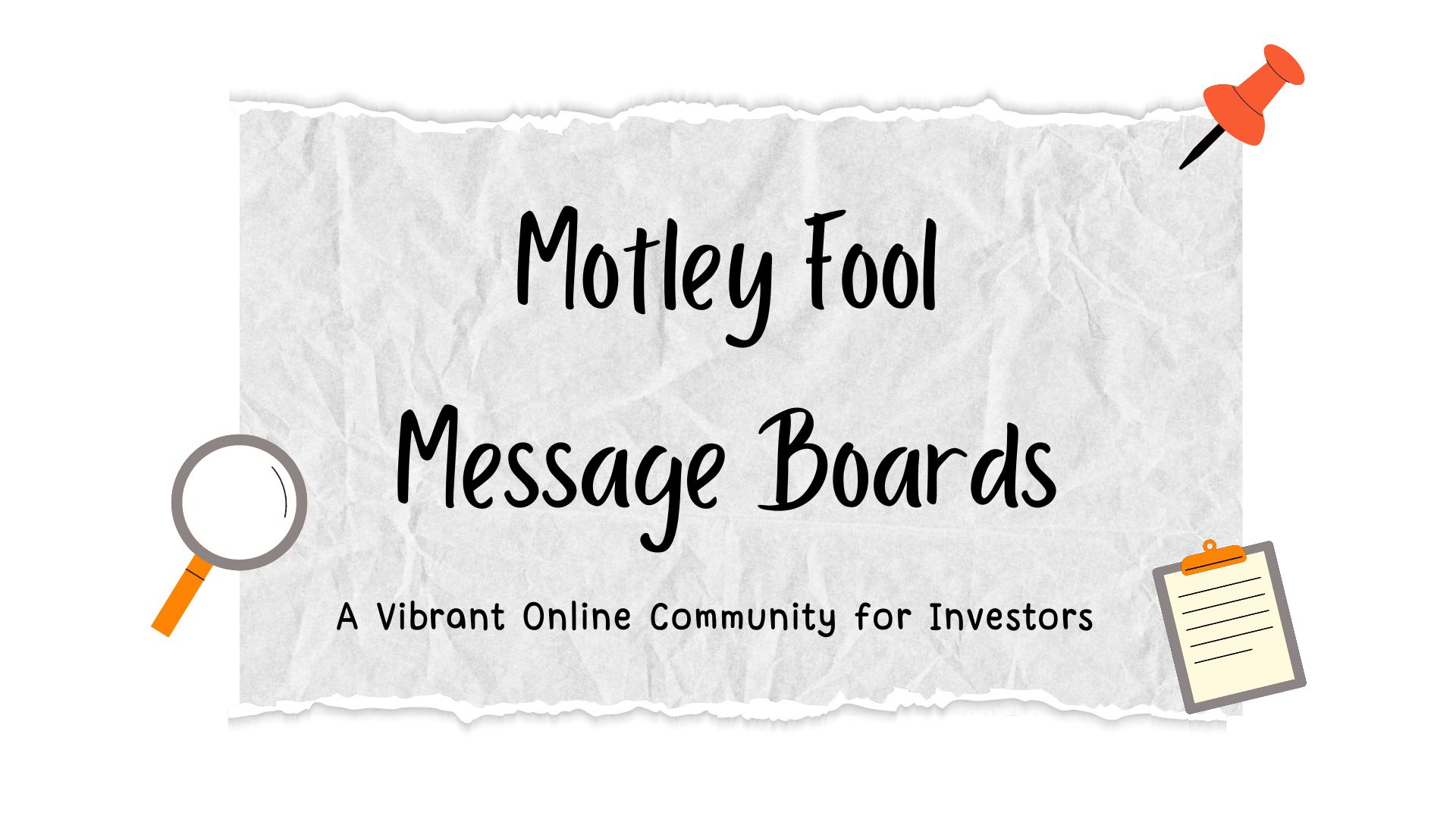More
The Motley Fool Message Boards: A Vibrant Online Community for Investors

The buzzing hub of investment insights, camaraderie, and endless learning – The Motley Fool Message Boards! If you’re an investor on the lookout for a vibrant online community where stock discussions thrive and wisdom is shared freely, then you’ve stumbled upon a goldmine. Join us as we dive into the evolution, features, success stories, and tips that make The Motley Fool Message Boards an invaluable resource for investors of all levels. Let’s unravel the tapestry of knowledge woven by Fools around the globe!
The History and Evolution of the Platform
In the early days of The Motley Fool, a small group of investors gathered online to share insights and ideas. What started as a modest forum soon blossomed into a thriving community of like-minded individuals passionate about investing. As the platform evolved, so did its features and functionalities, adapting to meet the needs of an ever-growing user base.
Over time, The Motley Fool message boards became synonymous with thoughtful discussions, sound advice, and camaraderie among investors from all walks of life. From seasoned professionals to beginners taking their first steps in the world of finance, everyone found a place at the virtual table.
With each passing year, new tools were introduced to enhance user experience and foster meaningful interactions. Today, The Motley Fool message boards continue to stand as a testament to the power of collaboration and shared knowledge in the realm of investing.
Features and Benefits for Investors
The Motley Fool Message Boards offer a plethora of features and benefits for investors looking to engage with like-minded individuals in the finance world. One key advantage is the diverse range of topics discussed, from stock analysis to retirement planning, catering to investors at all stages of their journey.
Members can tap into a wealth of knowledge and experience shared by fellow Fools, gaining valuable insights and perspectives that can inform their investment decisions. The platform also fosters a sense of community where users can seek advice, share success stories, or simply connect with others who share their passion for investing.
Moreover, real-time discussions allow for quick responses and feedback on market trends or specific stocks, creating an interactive environment where ideas are constantly flowing. With features designed to enhance user experience and facilitate meaningful conversations, The Motley Fool Message Boards truly stand out as a valuable resource for investors seeking to broaden their financial acumen.
How to Join and Navigate the Message Boards
Interested in joining The Motley Fool Message Boards to connect with like-minded investors and discuss stock picks? Signing up is a breeze! Simply create an account on The Motley Fool website, verify your email address, and voilà – you’re ready to dive into the vibrant community of Fools.
Once you’ve set up your account, navigating the message boards is intuitive. Explore different forums based on topics of interest such as individual stocks, investment strategies, or personal finance tips. Engage in discussions by posting your thoughts or questions and interacting with fellow members through likes and replies.
Make sure to familiarize yourself with the forum rules to maintain a respectful environment for all users. Use the search function to find specific threads or topics easily. Don’t be shy about contributing your insights – remember, everyone has something valuable to bring to the table in this diverse community of investors.
Tips for Using the Message Boards Effectively
Navigating The Motley Fool Message Boards can be both exciting and overwhelming for new users. To make the most of your experience, start by familiarizing yourself with the different boards available. Whether you’re interested in stock discussions, personal finance tips, or general investing advice, there’s a board for every topic.
Once you’ve found a board that aligns with your interests, take some time to observe the conversations happening. This will give you a sense of the community dynamics and help you understand the tone and etiquette expected on the boards.
When engaging in discussions, remember to be respectful and constructive in your interactions. Avoid personal attacks or spreading false information. Instead, focus on sharing valuable insights and asking thoughtful questions that contribute positively to the conversation.
Don’t hesitate to ask for clarification if something is unclear or seek guidance from more experienced members. The message boards are meant to be a collaborative space where investors can learn from each other’s perspectives.
Remember that while participating in discussions is beneficial, always conduct thorough research before making any investment decisions based on information gathered from the message boards. Trust but verify!
Success Stories from Members of the Community
The Motley Fool Message Boards are a treasure trove of success stories from members who have found valuable insights and made informed investment decisions. From discovering undervalued stocks to navigating market uncertainties, users share their triumphs and lessons learned with the community.
One member recounts how a discussion on a particular biotech company led them to invest early, resulting in significant gains as the stock soared. Another shares how they diversified their portfolio based on recommendations received on the forum, ultimately mitigating risks during market downturns.
These success stories not only inspire others but also highlight the collaborative spirit and wealth of knowledge present within The Motley Fool community. Whether it’s a beginner celebrating their first profitable trade or a seasoned investor sharing strategies that paid off handsomely, these anecdotes underscore the power of collective wisdom in making sound financial choices.
Potential Risks and Precautions
Engaging in online discussions on The Motley Fool Message Boards can be a rewarding experience for investors seeking insights and community support. However, like any online platform, there are potential risks that users should be aware of.
One risk to consider is the spread of misinformation. With a diverse range of opinions being shared, it’s essential to fact-check and verify information before making any investment decisions based on forum discussions.
Another precaution to keep in mind is the importance of maintaining privacy and security. Avoid sharing sensitive personal or financial information on public forums to protect yourself from potential scams or identity theft.
Furthermore, it’s crucial to approach advice given by other users with caution. While many members provide valuable insights, not all recommendations may align with your individual financial goals or risk tolerance.
By staying vigilant, discerning, and respectful in your interactions on The Motley Fool Message Boards, you can make the most out of this vibrant online community while mitigating potential risks.
The founding of The Motley Fool and the birth of its online forums
In the early days of online investing, brothers David and Tom Gardner founded The Motley Fool with a vision to educate, amuse, and enrich individual investors. What started as a humble investment newsletter blossomed into a vibrant online community where like-minded individuals could gather to discuss stocks, share insights, and learn from one another.
As the internet landscape evolved, so did The Motley Fool’s offerings. The birth of its online forums in the 1990s marked a pivotal moment for retail investors looking to connect with peers outside traditional financial circles. These forums provided a platform for users to engage in lively discussions about market trends, investment strategies, and personal finance matters.
The launch of The Motley Fool message boards democratized access to valuable investment information and fostered a sense of camaraderie among members who shared a passion for all things finance-related. Through open dialogue and diverse perspectives…
How the message boards became a go-to destination for investor discussions
The Motley Fool message boards didn’t just become a go-to destination for investor discussions overnight. It was a gradual evolution fueled by the passion and knowledge-sharing of its community members.
At first, it started as a small corner on The Motley Fool website where investors could exchange ideas and insights. But as more people joined in, the message boards quickly grew into a vibrant hub of discussion on all things related to finance and investing.
What set the message boards apart was their focus on quality conversations and valuable contributions from participants of all levels of expertise. From newbies seeking guidance to seasoned pros sharing their strategies, everyone found value in engaging with like-minded individuals.
As word spread about the insightful discussions happening on the message boards, more investors flocked to join in, creating a diverse and dynamic community that continues to thrive today.
The wide range of investors who participate on the message boards
The Motley Fool Message Boards attract a diverse group of investors, ranging from novices eager to learn the ropes to seasoned experts sharing their insights. It’s a melting pot of perspectives and experiences, creating a dynamic environment where ideas are exchanged freely.
New investors find guidance and support from more experienced members who offer valuable advice on navigating the complexities of the stock market. Seasoned professionals engage in deep discussions about investment strategies, dissecting market trends with precision.
From college students dipping their toes into investing for the first time to retirees looking to grow their nest egg, there’s a place for everyone at The Motley Fool. Whether you’re conservative or risk-loving, long-term focused or day-trading aficionado, you’ll find like-minded individuals ready to engage in thoughtful conversations about all things finance.
From beginner to expert, everyone finds a place in the Motley Fool community
The Motley Fool community is a diverse and inclusive space where investors of all levels can come together to learn, share, and grow. Whether you’re just starting your investing journey or you’re a seasoned pro, there’s a place for you here.
Beginners can ask questions without fear of judgment and receive guidance from more experienced members who are eager to help. The atmosphere is welcoming and supportive, making it easy for newcomers to dive into the world of investing.
For those with more knowledge under their belts, the message boards offer an opportunity to share insights, engage in thoughtful discussions, and even mentor others who are still learning the ropes. It’s a place where expertise is valued and respected.
No matter where you fall on the spectrum of investing experience, The Motley Fool community provides a platform for growth, collaboration, and connection with like-minded individuals who share your passion for financial success.
The Motley Fool’s emphasis on constructive, insightful conversations
The Motley Fool’s emphasis on constructive, insightful conversations sets it apart as a beacon of knowledge and collaboration in the world of investing. From seasoned investors to newcomers eager to learn, the forums foster an environment where ideas are exchanged freely and respectfully. The platform champions thoughtful discussions that delve deep into market analysis, stock picks, and personal finance strategies.
Members are encouraged to share their perspectives while also engaging with opposing viewpoints in a spirit of intellectual curiosity. This commitment to diverse opinions enriches the community and allows for well-rounded insights that benefit all participants. Moderators play a key role in ensuring discussions remain focused, informative, and respectful.
Investors can tap into this collective wisdom to broaden their understanding of various investment opportunities and risks. By actively participating in these exchanges, individuals gain valuable insights that can inform their own financial decisions moving forward.
Moderation practices that encourage quality discussions
The Motley Fool Message Boards are known for their proactive moderation practices that foster a positive and constructive environment. Moderators play a vital role in ensuring discussions remain respectful, insightful, and on-topic. They encourage users to share well-reasoned opinions while discouraging personal attacks or spammy behavior.
Moderators also help maintain the overall quality of discussions by enforcing community guidelines and stepping in when necessary to redirect conversations back on track. Their presence helps uphold the high standards of discourse that have become synonymous with The Motley Fool community.
By promoting civility and expertise, moderators contribute to an atmosphere where all members feel valued and empowered to participate meaningfully. This approach sets the tone for fruitful exchanges that benefit both novice investors seeking guidance and seasoned professionals looking for diverse perspectives.
How the collective wisdom of the message boards informs investment decisions
Whenever investors engage in discussions on The Motley Fool Message Boards, they tap into a pool of collective wisdom that can shape their investment decisions. With diverse perspectives and insights shared by members from various backgrounds, the forums offer a unique opportunity to broaden one’s understanding of different industries, companies, and market trends.
By participating in these discussions, individuals can gain valuable knowledge and viewpoints that may influence their investment strategies. Whether it’s analyzing financial reports, evaluating growth potential, or discussing risk factors, the collaborative nature of the message boards allows for a holistic approach to decision-making.
The exchange of ideas on the platform fosters critical thinking and encourages investors to consider multiple angles before making their moves. It serves as a virtual think tank where members challenge each other’s assumptions and provide well-reasoned arguments to support their perspectives.
Real-time discussions and debate around stocks, sectors, and market trends
The Motley Fool Message Boards serve as a dynamic platform for real-time discussions and debates surrounding stocks, sectors, and market trends. Investors from all walks of life come together to share insights, analyze data, and exchange opinions on the latest happenings in the financial world.
Whether you’re a seasoned trader or just starting out in the investment game, there’s something for everyone on the message boards. From lively debates about individual stock picks to in-depth analyses of emerging market trends, members are encouraged to participate actively and contribute meaningfully to the ongoing conversations.
The diverse perspectives offered by fellow Fools can offer valuable insights that may inform your own investment decisions. By engaging with like-minded individuals who share a passion for finance, you can broaden your understanding of different sectors and gain new perspectives on market dynamics.
The message boards as a hub for all things personal finance related
The Motley Fool message boards are not just about stock picks and market analysis. They serve as a dynamic hub where investors can delve into all aspects of personal finance. From budgeting tips to retirement planning strategies, there’s a wealth of information shared by members with diverse financial backgrounds.
Whether you’re looking to optimize your investment portfolio or seeking advice on managing debt, the message boards offer a supportive community ready to share their knowledge and experiences. Discussions range from frugal living hacks to discussions on the latest fintech innovations shaping the financial landscape.
Members engage in lively debates on topics like real estate investing, passive income streams, and even unconventional money-saving techniques. The variety of perspectives ensures that there’s something for everyone, regardless of their financial goals or level of expertise.
Joining these discussions can broaden your financial literacy and inspire new approaches to building wealth over time. It’s not just about making smart investment decisions; it’s about fostering a holistic approach to personal finance that aligns with your values and long-term aspirations.
The social aspects that build a sense of camaraderie among Fools
The Motley Fool Message Boards are not just a place to discuss stocks and investments; they also foster a sense of community among members.
Through shared experiences, insights, and even the occasional joke or meme, Fools from all walks of life come together to support each other on their investing journeys.
Whether you’re a seasoned investor or just starting out, the camaraderie found on the message boards can provide encouragement, advice, and sometimes even a virtual pat on the back during both gains and losses.
The social aspects of these forums create bonds that go beyond mere financial discussions. Members often form friendships that extend beyond the digital realm, further solidifying the sense of belonging within The Motley Fool community.
So next time you visit the message boards, remember that it’s not just about numbers and market trends; it’s also about connecting with like-minded individuals who share your passion for investing.
How the forums have adapted and grown over the years
Over the years, The Motley Fool Message Boards have evolved into a dynamic online community that continues to adapt to the changing needs of investors. Initially starting as a platform for stock discussions, the forums now cover a wide range of topics including personal finance, retirement planning, and even cryptocurrency.
With advancements in technology and user feedback, the message boards have implemented new features like real-time notifications, personalized feeds, and improved search functions. These enhancements make it easier for members to stay engaged and informed on topics that matter most to them.
The growth of the forums has also led to an increase in diverse perspectives and expertise among participants. Investors from all backgrounds – whether beginners seeking guidance or seasoned professionals sharing insights – can find valuable information and support within this vibrant community.
As market trends shift and investment strategies evolve, The Motley Fool Message Boards remain a trusted resource for individuals looking to expand their knowledge, connect with like-minded peers, and navigate the complexities of financial decision-making.
New features and functionalities that enhance the user experience
The Motley Fool message boards continuously evolve to provide users with enhanced features and functionalities. One notable addition is the personalized feed that curates relevant discussions based on users’ interests and activity. This tailored content stream helps investors stay informed on topics they care about without sifting through endless threads.
Another valuable feature is the integration of real-time market data directly into discussions, allowing members to analyze stock performance within the forum environment. This seamless access to financial information fosters more informed decision-making and lively debates around investment opportunities.
Additionally, improved search capabilities make it easier for users to find specific threads or topics of interest quickly. The advanced filtering options enable investors to pinpoint relevant conversations efficiently, saving time and enhancing overall user experience on the platform.
Moreover, interactive tools like polls and surveys engage community members in a dynamic way, encouraging active participation and diverse perspectives within the forums. These innovative features contribute to a vibrant online space where investors can learn from each other and grow their knowledge base organically.
Conclusion: Why The Motley Fool Message Boards are a Valuable Resource for Investors
The Motley Fool Message Boards are a powerhouse of knowledge and community spirit for investors looking to dive deep into the world of finance. With a rich history and robust features, these forums offer a dynamic space where individuals from all walks of life can come together to share insights, ask questions, and make informed decisions about their investments.
From beginners seeking guidance to seasoned experts sharing their wisdom, the diversity of perspectives on the message boards creates a vibrant tapestry of ideas and strategies. The platform’s emphasis on constructive dialogue fosters an environment where learning thrives, making it a valuable resource for those eager to expand their financial acumen.
With real-time discussions, personalized advice, and an engaged community rallying behind each other’s success stories, The Motley Fool Message Boards stand out as more than just a forum – they’re a supportive network that empowers investors to grow their wealth with confidence.
FAQs
Q: How do I join The Motley Fool Message Boards?
A: To join the vibrant online community at The Motley Fool Message Boards, simply create a free account on The Motley Fool website. Once registered, you can start engaging with other investors and sharing insights on various investment topics.
Q: Are there any fees associated with using The Motley Fool Message Boards?
A: No, participating in discussions on The Motley Fool Message Boards is completely free for all users. Whether you’re a seasoned investor or just starting out, you can access this valuable resource without any cost.
Q: Can I remain anonymous while using the message boards?
A: Yes, users have the option to choose a username that does not reveal their real identity. This anonymity allows individuals to freely share opinions and discuss investment ideas without concerns about privacy.
Q: How can I navigate and search for specific topics on the message boards?
A: The message boards are organized into different categories and threads based on specific investment themes. You can use the search function to find relevant discussions or explore trending topics within the community easily.
In conclusion:
The Motley Fool Message Boards serve as more than just an online forum; they are a dynamic hub where investors of all levels come together to learn, share knowledge, and engage in meaningful conversations about investing. With its rich history, diverse user base, emphasis on constructive dialogue, and continuous evolution through new features – it’s no wonder why many consider these forums an invaluable resource for enhancing their investment journey. Join today and be part of this thriving community where wisdom meets camaraderie!
FOR FURTHER INFORMATION VISIT: fitbuff.com
More
Onion Play: A Comprehensive Guide to Free Streaming

In the ever-evolving world of online entertainment, Onion Play has emerged as a notable platform for streaming movies and TV shows without subscription fees. Offering a vast library of content across various genres, it caters to users seeking cost-free viewing experiences. However, as with many free streaming services, it’s essential to understand the platform’s features, legal implications, and potential risks.
Understanding Onion Play
Onion Play is a free online streaming website that provides access to a wide range of movies, TV shows, and documentaries. Users can stream content directly from their browsers without the need for registration or subscription fees. The platform aggregates links from various sources, allowing viewers to watch content in high-definition (HD) and even 4K quality, depending on their device and internet connection.
Key Features of Onion Play
1. Extensive Content Library
Onion Play boasts an extensive collection of over 200,000 movies and numerous TV series episodes. The content spans various genres, including action, drama, comedy, romance, horror, and more. Users can explore titles through categories like “Trending,” “New Releases,” and by genre, or use advanced filters for a more refined search experience.
2. High-Quality Streaming
The platform provides high-definition (HD) and 4K streaming options, ensuring an immersive viewing experience with vivid clarity and vibrant colors. Adaptive streaming technology adjusts video quality based on the user’s internet speed, minimizing buffering and interruptions.
3. User-Friendly Interface
Onion Play features a straightforward and intuitive interface, making it easy for users to navigate through categories and genres. The search functionality enables quick discovery of specific content, enhancing the overall user experience.
4. No Registration Required
One of Onion Play’s most attractive features is that users can stream content without creating an account or providing personal information. This allows viewers to access movies and TV shows immediately with just a click.
5. Multi-Device Compatibility
The platform is accessible on various devices, including desktops, laptops, smartphones, tablets, and smart TVs. This multi-platform availability ensures that users can enjoy content on their preferred devices, whether at home or on the go.
Legal and Safety Considerations
1. Copyright Issues
Onion Play operates in a legal gray area, as it provides access to copyrighted content without proper licensing. Streaming such content may violate copyright laws in many jurisdictions, potentially leading to legal consequences for users.
2. Security Risks
Free streaming sites like Onion Play often come with security risks, including malware and phishing attempts. Users may encounter pop-up ads, redirects, or malicious software that can compromise their devices and personal information. Employing ad blockers, antivirus software, and VPNs can mitigate some of these risks, but they do not eliminate the possibility of encountering malicious activities.
3. Mirror Sites and Impersonators
Due to frequent domain changes to avoid shutdowns, Onion Play has multiple mirror sites. These mirror or copycat sites typically don’t have links to the original Onion Play and are often hosted by unregulated third parties. Such sites may pose even greater security risks, including exposure to malware and data theft.
Comparing Onion Play to Legal Streaming Services
While Onion Play offers free access to a vast library of content, it’s essential to compare it with legal streaming services in terms of pricing, video quality, user experience, and legality.
1. Pricing
Onion Play is entirely free, making it appealing to users who want to access content without spending money. In contrast, legal streaming services like Netflix, Amazon Prime Video, Hulu, and Disney+ require monthly subscription fees, which vary depending on the plan and region.
2. Video Quality and User Experience
Legal streaming platforms provide consistently high video quality, including 4K resolution and HDR support on selected content. They also offer seamless user experiences with intuitive interfaces, personalized recommendations, and smooth playback. Onion Play, while offering HD and 4K options, may have inconsistent streaming experiences due to its free nature and potential server limitations.
3. Legality and Security
Legal streaming services operate with proper licenses and are committed to protecting user data with top-notch security protocols. Using platforms like Onion Play may expose users to legal risks and security threats, including malware and data breaches.
Tips for Safe Streaming
If you choose to use platforms like Onion Play, consider the following precautions to enhance your safety:
- Use a Reliable VPN: A Virtual Private Network can help protect your privacy by masking your IP address and encrypting your internet connection.
- Install Ad Blockers: Ad blockers can minimize exposure to intrusive ads and reduce the risk of encountering malicious content.
- Keep Antivirus Software Updated: Regularly updating your antivirus software can help detect and prevent malware infections.
- Avoid Clicking on Suspicious Ads: Be cautious of pop-up ads or redirects that may lead to harmful websites.
- Stay Informed About Legal Implications: Understand the copyright laws in your jurisdiction to avoid potential legal issues.
Conclusion
Onion Play offers a vast library of movies and TV shows for free, attracting users seeking cost-free entertainment. Its user-friendly interface, high-quality streaming options, and extensive content library make it a popular choice among viewers. However, the platform operates in a legal gray area and may pose security risks to users. While it provides an alternative to paid streaming services, it’s crucial to weigh the benefits against the potential legal and safety concerns. For a secure and lawful viewing experience, consider subscribing to licensed streaming platforms that ensure content creators are rightfully compensated.
More
Switching 2nd: A Strategic Move That Changes the Game

In many fields—sports, business, or even education—the phrase “Switching 2nd” carries a unique and powerful implication. Whether it’s changing positions in a team lineup or making a tactical adjustment mid-process, “Switching 2nd” reflects a moment when a secondary option becomes a primary strategy. Though the phrase may sound vague to the casual observer, it holds weight in competitive and decision-making contexts.
In this article, we will dive into the meaning of “Switching 2nd,” its usage across various domains, and why it has become a key phrase in strategic conversations. Transition words and real-life examples will guide you through each concept, making the term more understandable and relatable.
What Does “Switching 2nd” Mean?
At its core, “Switching 2nd” refers to changing a position, role, or plan that was originally second in order or importance. This switch can be voluntary, driven by strategy, or involuntary, resulting from necessity. In many scenarios, the second position is considered supportive, but when switched, it may take on a lead role.
This concept is not new. Historically, secondary options have become lifesavers when primary plans fail. What’s new is the popularity of the term across various disciplines, especially on social media, forums, and modern commentary.
Switching 2nd in Sports
Team Dynamics and Player Roles
In sports, Switching 2nd is often used to describe when a player changes from the second position to the first. For example, in baseball, a second baseman might move to shortstop due to injury or strategy. Likewise, in soccer, a striker might switch roles with a winger to outsmart the opposing defense.
Switching positions can be a game-changer. Although it may seem like a minor adjustment, it often results in improved performance, better coordination, or an unexpected advantage. Consequently, coaches and analysts frequently use this strategy to surprise the opposition.
Real-Life Example
Take the 2014 FIFA World Cup: Germany often rotated its players, “switching 2nd” attackers to midfield roles, confusing teams like Brazil. This strategic switch helped them dominate the tournament.
Switching 2nd in Business Strategy
Plan B Becomes Plan A
In the business world, Switching 2nd refers to moments when a backup plan becomes the new direction. This might happen when a company shifts from a primary product to a more successful secondary one.
Apple Inc. is a great example. Originally a computer company, its secondary product—the iPhone—quickly became its flagship. The company “switched 2nd” by prioritizing smartphones, and that move reshaped global tech forever.
Leadership and Organizational Change
Sometimes, a deputy or assistant manager rises to the top position unexpectedly. This is another form of Switching 2nd. Notably, companies often plan succession paths, ensuring the second-in-command is ready to take over if needed. This proactive planning enhances stability and shows the long-term value of “second” roles.
Switching 2nd in Education and Learning
In education, Switching 2nd can refer to students changing majors, shifting learning methods, or even switching to a second language as the main language of instruction. It might also involve moving from secondary schools to alternative educational institutions for better opportunities.
Example: Language Learning
A student may start learning French as a secondary language, but later switch it to their main language due to immigration or career needs. In this case, Switching 2nd becomes more than just academic—it shapes identity and opportunities.
Psychological Impact of Switching 2nd
Confidence and Flexibility
The act of switching from a second to a first position often requires a mindset of adaptability and courage. For some, the switch is empowering. It allows them to showcase hidden talents or operate more freely. For others, it may feel intimidating—taking the lead can bring pressure and responsibility.
However, those who embrace the change often emerge more confident, skilled, and appreciated. This transformation underscores the deeper emotional layers of “Switching 2nd.”
Pop Culture References
In film and television, characters often begin in secondary roles but emerge as heroes. Think of Samwise Gamgee in The Lord of the Rings—initially a supporting character, he eventually plays a pivotal role in Frodo’s journey. Similarly, in the Harry Potter series, characters like Neville Longbottom show how switching from the background to the spotlight can shape destiny.
These stories resonate because they reflect real human experiences. Everyone, at some point, has felt like they were second. Switching 2nd is a metaphor for stepping into your moment.
Challenges in Switching 2nd
While the phrase sounds empowering, it’s not without its hurdles:
- Role Confusion: Others may not recognize or respect the change.
- Expectations: The pressure to perform increases drastically.
- Time to Adjust: The transition from second to first isn’t always seamless.
Despite these challenges, those who adapt often achieve remarkable success.
Why “Switching 2nd” Matters Today
In today’s fast-changing world, flexibility is more valuable than ever. Whether it’s a business adjusting to market changes, an athlete adapting to a new position, or a student pivoting toward a new field, the ability to switch and succeed in a secondary role is essential.
Moreover, the digital world has democratized how people rise. Influencers, once considered “second” to celebrities, now lead major campaigns. Similarly, startup companies, once considered second-tier, are now redefining industries.
Conclusion: Embracing the Power of Second
In conclusion, Switching 2nd is more than a tactic—it’s a mindset. It teaches us that being second doesn’t mean being inferior. Often, second positions offer the best view of what needs to change. When the time is right, switching into that first spot can yield success, innovation, and transformation.
The next time you find yourself in the second spot, remember: you might just be in the perfect position to switch—and win.
More
Tonghou: Exploring the Meaning, Significance, and Cultural Impact

The term Tonghou may be unfamiliar to some, but it holds layered significance depending on the context in which it is used. From historical references to modern interpretations, Tonghou can relate to geography, culture, names, or institutions, particularly in East Asian contexts. Understanding what Tonghou means and where it appears can offer insight into both its cultural depth and practical relevance in today’s global landscape.
In this article, we explore the various meanings and uses of Tonghou, including its linguistic roots, geographic associations, potential cultural impact, and how it’s interpreted in different sectors.
What Is Tonghou?
The word Tonghou can serve multiple roles, depending on linguistic and regional context. In Chinese, “Tong” (通) often denotes communication, connectivity, or passage, while “Hou” (候) can mean to wait, expect, or refer to a noble rank. When combined, Tonghou might be interpreted as a proper noun, a place name, or a surname.
Alternatively, Tonghou could be transliterated from local dialects or used as a brand name, organization title, or institution, reflecting a mix of modern innovation and traditional influence. While there is no universally accepted definition, its usage reveals a pattern of importance in cultural, historical, and geographical contexts.
Historical and Geographical Relevance of Tonghou
1. Tonghou in East Asian Geography
In some regions, Tonghou refers to a specific location, such as a town, river, or administrative division. For example, Tonghou River or Tonghou Township may appear on maps in Taiwan or Mainland China, often associated with natural landmarks or historical trade routes.
These areas often bear the name due to their strategic importance — as transit routes or communication hubs — aligning with the meaning of “通” (passage or access). Such names typically reflect the region’s historical roles in commerce, governance, or military movements.
2. Tonghou as a Surname
Though less common, Tong–hou may also appear as a compound surname or given name in Chinese or Vietnamese culture. In these cases, the name could carry philosophical or aspirational meaning, often associated with virtues like patience, connectivity, or leadership.
Modern Usage and Cultural Significance of Tonghou
1. Tonghou as a Brand or Organization
In recent years, Tong-hou has also been adopted as a company or brand name across sectors such as technology, logistics, education, and manufacturing. The appeal lies in the characters’ positive connotations:
-
“Tong” (通): Implying connectivity, integration, and efficiency
-
“Hou” (候): Suggesting precision, strategy, and patience
Companies with names like Tong-hou Logistics or Tonghou Education Group may aim to project reliability, communication efficiency, and future-oriented thinking. This makes the name valuable in branding strategies focused on innovation and trustworthiness.
2. Tonghou in Philosophy and Literature
Some literary interpretations use Tong-hou to represent harmony between time (waiting or expecting) and action (communication or movement). In philosophical texts or poems, these dual meanings offer a metaphorical perspective on life balance, strategic thinking, or even political governance.
While rare in mainstream literature, niche publications, essays, and traditional poetry occasionally reference Tonghou as a symbolic idea — a balance of movement and stillness, readiness and response.
Tonghou and Digital Presence
1. Domain Names and Online Identity
With globalization and digital branding, unique terms like Tong-hou have become desirable for domain names and online platforms. Businesses, artists, and content creators may register tonghou.com or similar domains to establish a distinct digital identity.
The uniqueness of the name allows for stronger search engine visibility and easier brand recognition. In an internet space saturated with generic names, “Tonghou” offers linguistic distinctiveness and cultural nuance.
2. Social Media and Content Creation
Creators in fields like education, traditional arts, or Chinese history may adopt Tong-hou as a social media handle or brand name. It can symbolize a connection between the past and the present — a nod to cultural roots while engaging with modern audiences.
Interpreting Tonghou Through Language
1. Linguistic Variations
Depending on tonal pronunciation and character selection, Tong-hou can take on different meanings in Mandarin or Cantonese. For example:
-
通候 (Tōnghòu): Could imply “waiting for communication” or “channel of waiting”
-
同厚 (Tónghòu): May refer to “equal generosity” or “shared kindness”
Understanding these variations is important for interpreting the term in cultural, poetic, or business contexts.
2. Cross-Cultural Influence
As more East Asian words and concepts enter the global lexicon, names like Tong-hou may be embraced internationally. They offer a blend of tradition and versatility, which appeals to multicultural businesses or art communities seeking symbolic resonance.
Ethical and Cultural Considerations
Using or referencing Tonghou in content, branding, or public discourse comes with a responsibility to understand its cultural implications. Misuse or superficial adoption without respect for its roots can lead to misrepresentation or cultural dilution.
When naming a company or project Tong-hou, it is respectful to research the origin, consult native speakers, or understand how it may be perceived by different cultural audiences.
Conclusion
Tonghou is a multifaceted term with deep linguistic, geographical, and cultural layers. Whether seen as a place name, a personal name, or a brand identity, it reflects core values like communication, patience, and connectivity. In both historical and modern contexts, Tong-hou remains relevant and thought-provoking.
As globalization continues to bring diverse terms into wider usage, understanding concepts like Tong-hou becomes essential. It’s more than just a name — it’s a reflection of cultural identity, philosophical thinking, and modern branding potential.
-

 Entertainment1 year ago
Entertainment1 year agoYoungTube 101: Tapping the Youthful Side of Online Video
-

 Pet2 years ago
Pet2 years agoDog Training Tips: Throw me a bone, will you?
-

 Entertainment2 years ago
Entertainment2 years ago4 Reasons Why She Doesn’t Call You Back
-

 Fitness1 year ago
Fitness1 year agoThe Allure of Sports T-Shirts: A Blend of Style and Team Spirit:
-

 Fitness2 years ago
Fitness2 years agoTotal Mind and Body Fitness Blog Carnival 165
-

 Fitness2 years ago
Fitness2 years agoTotal Mind and Body Fitness Blog Carnival 141
-

 Health2 years ago
Health2 years agoWhat Is Healthy?
-

 Pet1 year ago
Pet1 year agoPet Supplies Plus: A Complete Guide to Pet Health
